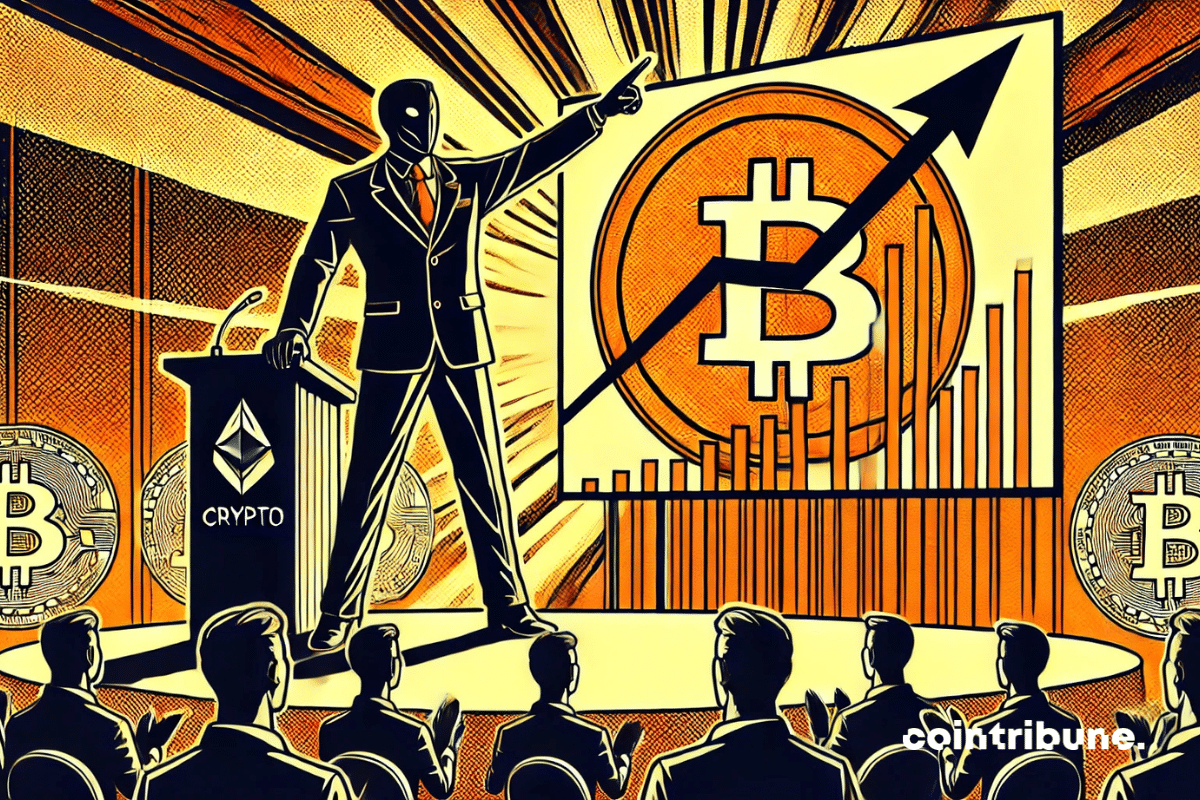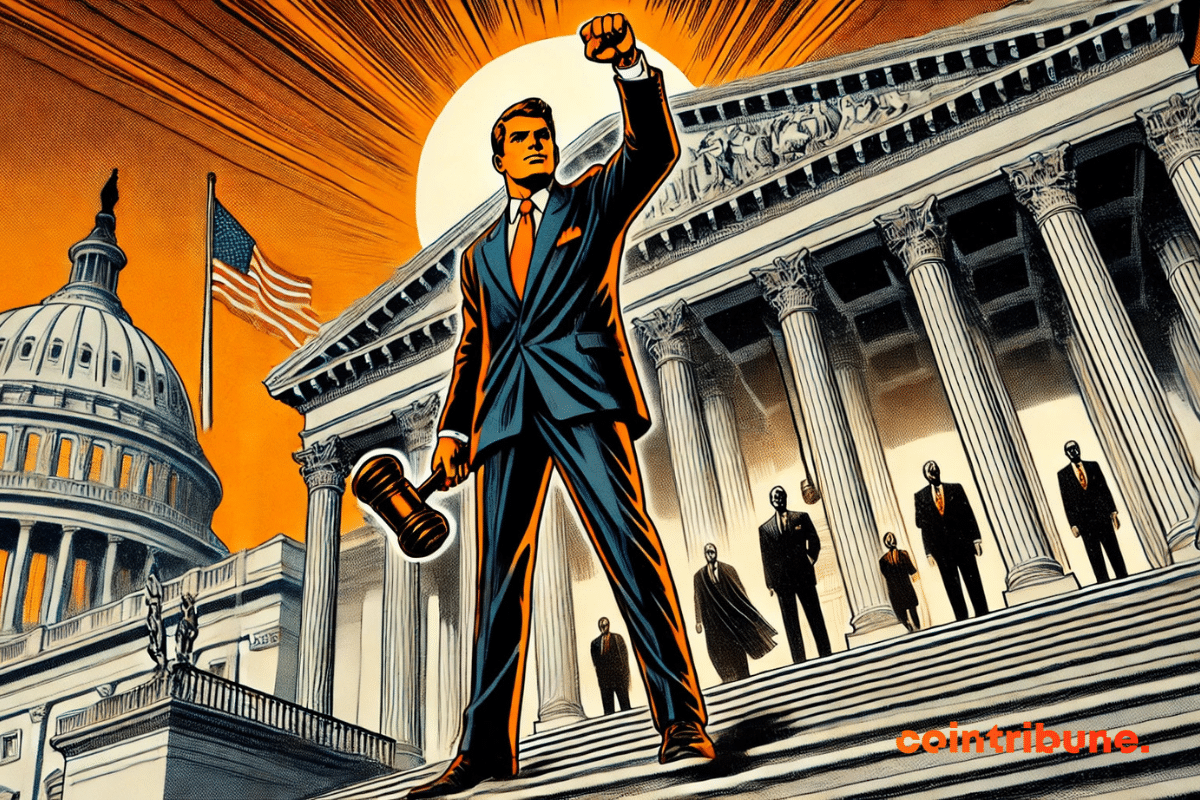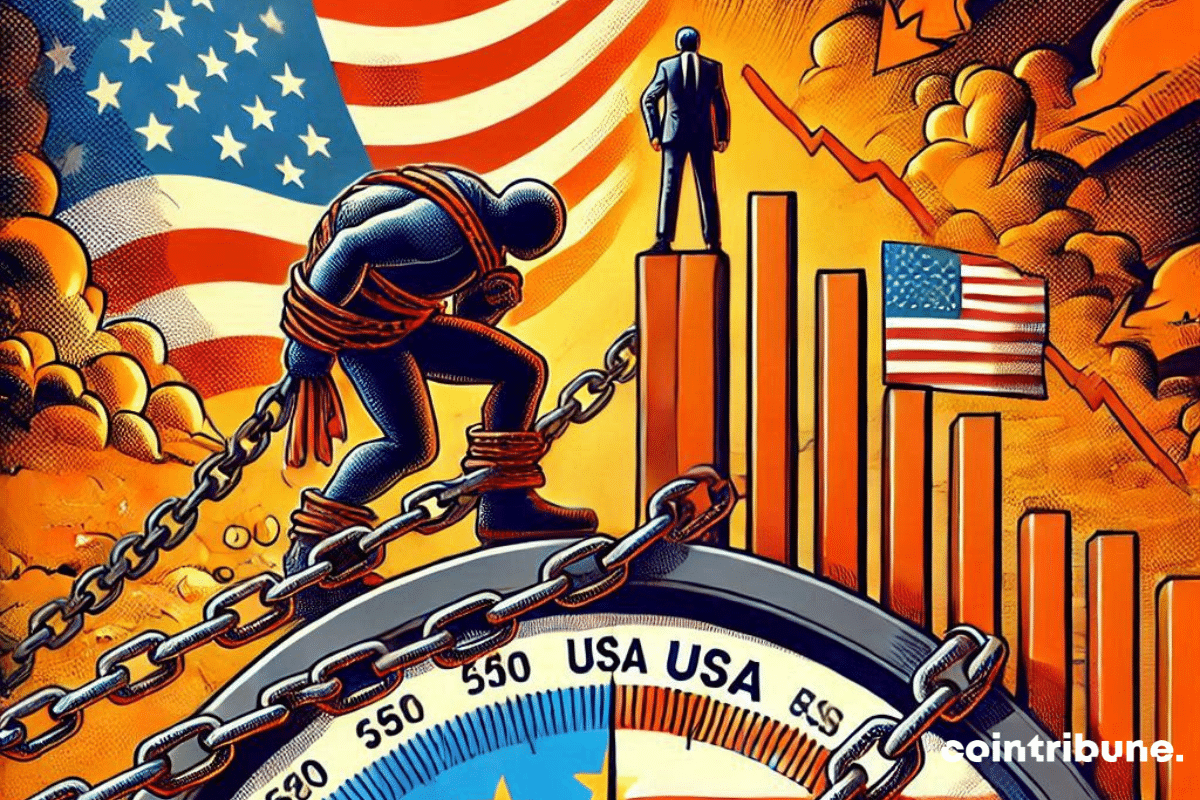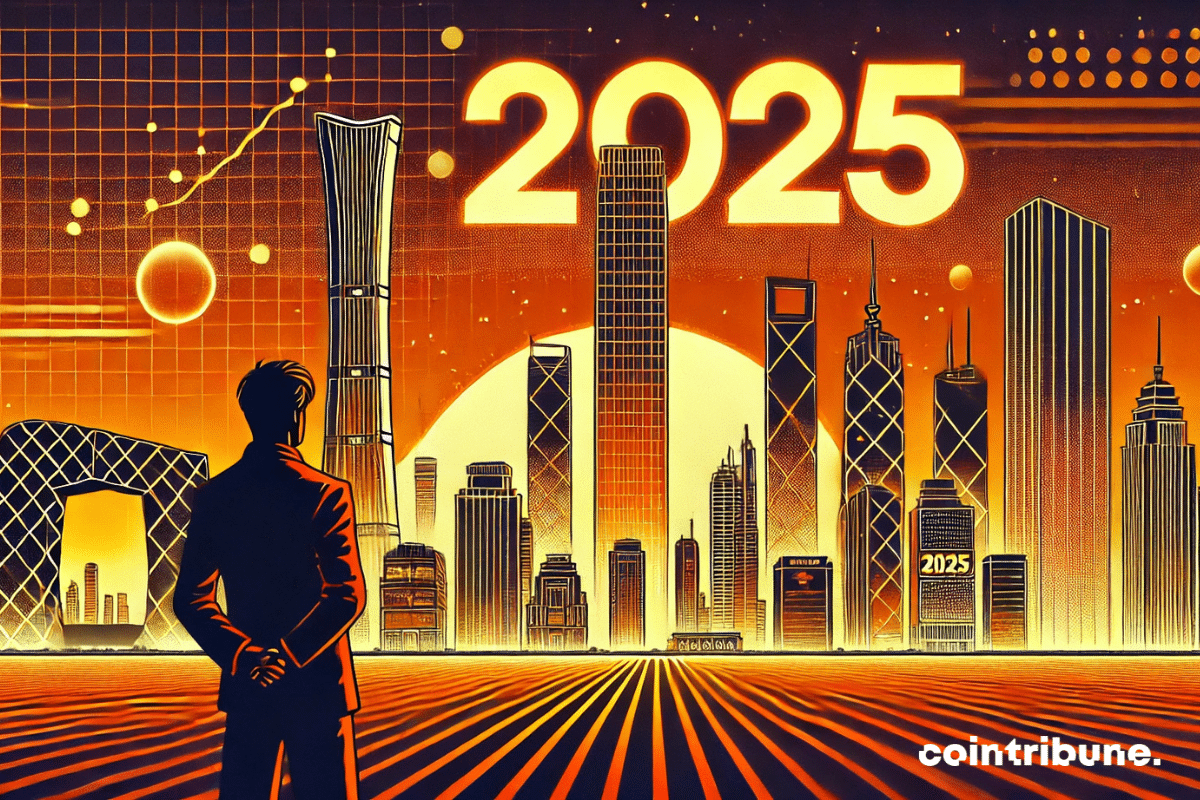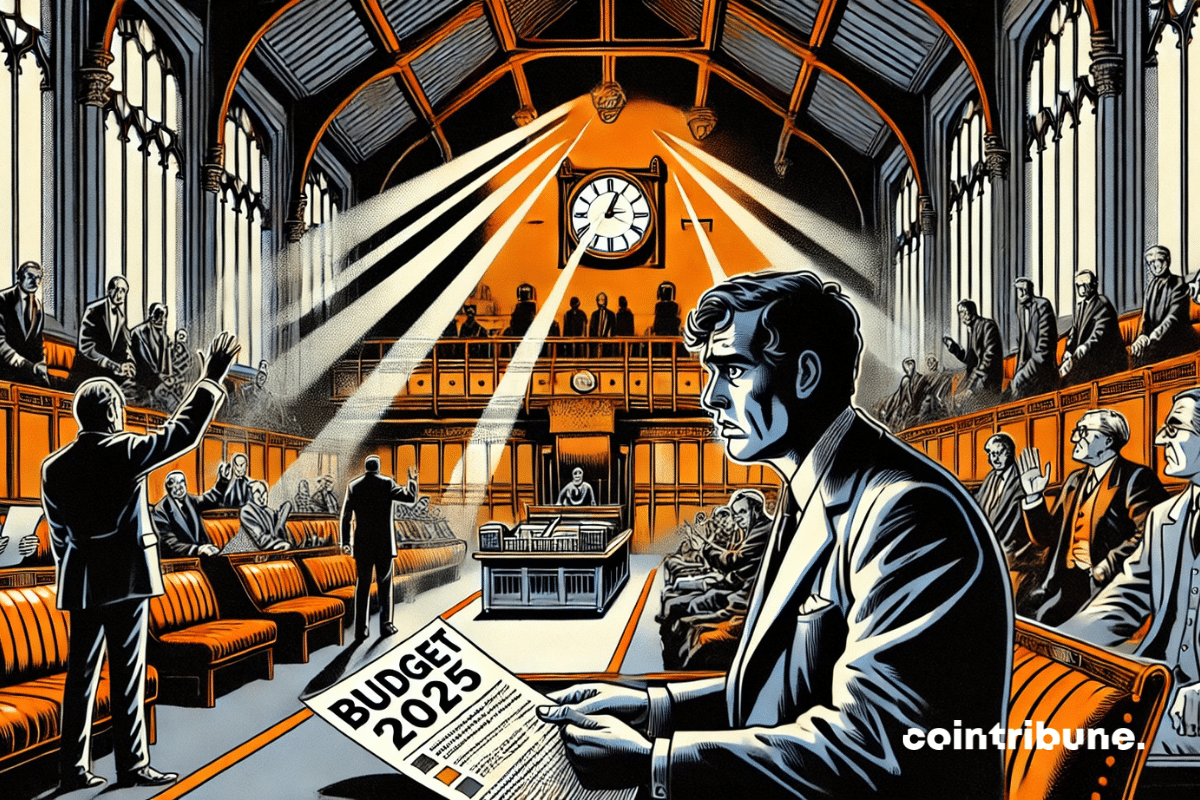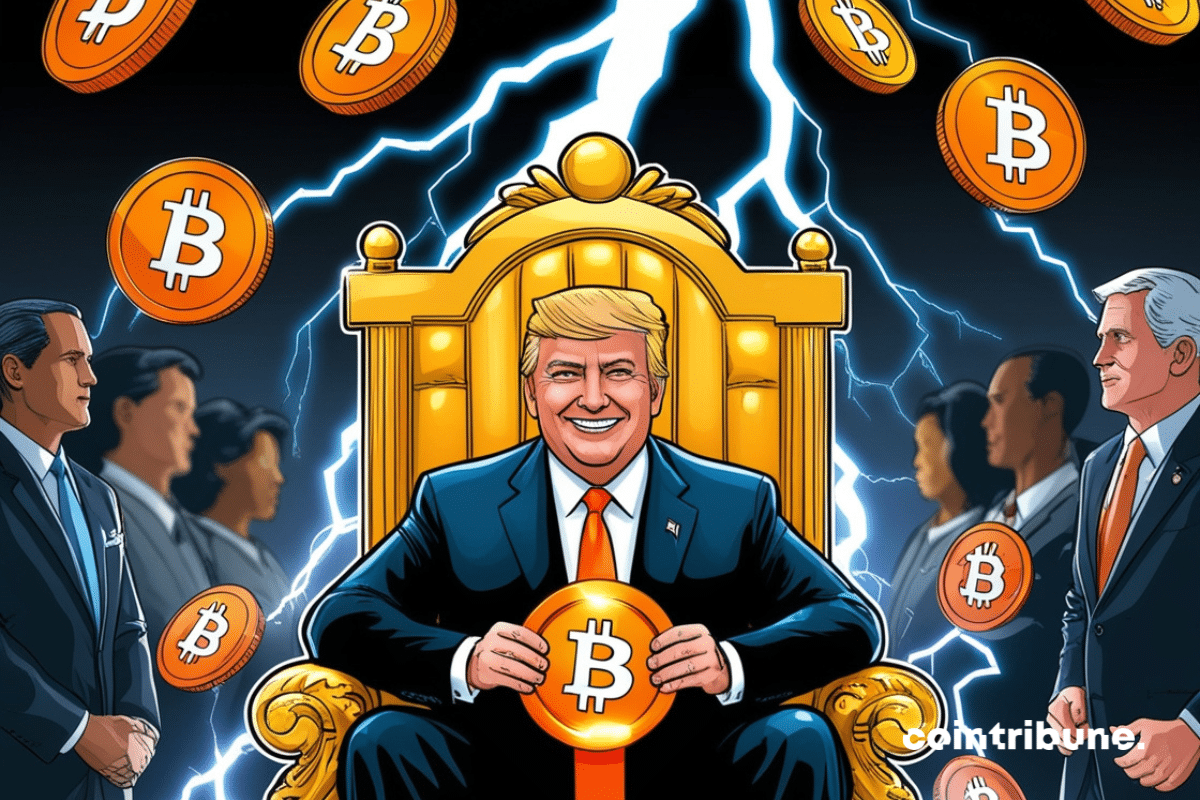A speculative wave approaching? Hoskinson predicts a Bitcoin orbit by the end of 2025. Discover the details of this prediction here!
Theme Regulation
Long suppressed by regulations deemed hostile, the American crypto industry may be on the brink of a major turnaround. Indeed, Donald Trump's return to the White House is accompanied by a clear shift in direction: to make the United States a bastion of financial technologies. An unprecedented discourse is taking root at the top of the state, driven by a desire to break away from the Biden era. Behind the announcements, a strategy is taking shape, promising a new momentum for cryptos and a rehabilitation of the sector in the eyes of regulators.
As the American economy wobbles, Donald Trump secures a strategic victory in the Senate with the unlocking of a controversial budget. Behind this success lies a political clash with global repercussions. For both investors and crypto players, this vote opens an uncertain sequence that could redefine financial balances and impact the trajectory of markets.
Money migrates, silent and methodical. Wall Street, once untouchable, sees its throne wobble under the hurried steps of investors, captivated by a Europe shining with trillions.
The BRICS continue to redefine the global geopolitical landscape. As the group expands and seeks to strengthen its influence, its relations with the West become strained. The latest episode: Iran, a new member of the bloc, has categorically rejected any negotiation with the United States. "Negotiating with America does not solve any of our problems," Tehran stated. This is a firm refusal of any diplomatic opening with Washington. This positioning, much more than a simple political statement, illustrates a growing rift between the BRICS and Western powers.
The EU, always quick to unleash paperwork before innovation, will implement its AI Act this Sunday: spectacular bans, imposed transparency, massive sanctions... AI had better watch out.
OKX and Crypto.com obtain their MiCA licenses. They gain access to 400M customers in 30 European crypto markets. Details here!
Entrepreneur and former presidential candidate Vivek Ramaswamy steps down from his position as co-director of the Department of Government Efficiency (DOGE) to run for governor of Ohio. This unexpected departure leaves Elon Musk as the sole leader of this controversial new federal organization, created by presidential decree.
The Department of Government Efficiency (DOGE), led by Elon Musk, could face legal action as soon as it is officially established. The law firm National Security Counselors is preparing a 30-page complaint, alleging violations of federal transparency law.
While the American economy soars like a star, Europe gets lost in a maze of rules and bitter regrets.
The Bank of Russia has recently introduced new regulations aimed at enhancing the oversight of currency exchange operations involving digital rights. These rights, as defined by Russian law, include electronic records such as cryptocurrencies, tokenized securities, and digital tokens. This initiative aims to integrate digital assets into the traditional financial system while ensuring financial stability.
The American Federal Reserve is divided over the potential inflationary consequences of the tariff increases promised by Donald Trump. While some officials downplay the risks, others fear a resurgence of inflation in an already strained economic context.
China is at a pivotal economic turning point. As the combined effects of weak consumption, an intensified real estate crisis, and high unemployment hinder its development, Beijing has just announced an ambitious budget policy for 2025. The stated objective is clear: to stimulate domestic demand and stabilize an economy under significant pressure. To achieve these ambitions, the government plans a significant increase in public spending, coupled with a revision of its fiscal priorities. These measures, detailed during a national conference, reflect a firm commitment to support local communities, expand social benefits, and strengthen resources for struggling businesses. Such a strategy, centered around innovation and strategic technologies, also aims to revitalize trade exchanges in order to adapt debt rules. With this comprehensive approach, Beijing intends to lay the groundwork for more resilient economic growth and to address the structural challenges that hinder its trajectory.
The crypto ecosystem could enter an unprecedented transformation phase. For years, markets have followed well-established cycles dictated by the internal mechanisms of bitcoin, including the halving, which times the periods of rise and fall. Today, a large-scale political initiative is emerging, likely to disrupt these historical foundations. American Senator Cynthia Lummis has proposed the Bitcoin Reserve Act, a bill aimed at recognizing bitcoin as a strategic reserve asset for the United States. This initiative, which plans for the gradual integration of one million bitcoins into the U.S. federal reserves, is set against a backdrop of increasing economic and geopolitical rivalries. As powers like Russia and Germany also consider adopting similar strategies, this proposal raises questions. Furthermore, the implications of such an approach go beyond American borders and redefine the role of Bitcoin on the international stage, granting it an unprecedented status in the history of cryptos.
The global economic landscape is at a critical phase. Every decision by the Federal Reserve (Fed) becomes a key signal, closely monitored by investors and financial analysts. In this context, the imminent announcement of a new interest rate cut sparks keen interest. As inflation, once rampant, begins to return to more controlled levels, the Fed is considering reducing its benchmark rate once again, this time to a range of 4.25% to 4.5%. This measure, which is part of an economic stabilization strategy, leaves no market indifferent. For cryptocurrencies, this announcement fuels both hope for a more favorable monetary environment and fear of increased instability. As Bitcoin and Ethereum already face significant declines, investors question the prospects ahead.
Europe, always trailing Washington, should soon align itself by lifting the curse on bitcoin.
Shaktikanta Das, the outgoing governor of the Reserve Bank of India (RBI), expressed his optimism about the future of CBDC in the Indian economy, stating that the digital rupee could definitively replace the paper-based economy.
Recent employment data in the United States suggests a likely reduction in interest rates in December, according to Grayscale. This outlook could influence financial markets, particularly bitcoin, which may benefit from this more accommodative monetary policy. Here’s what the figures reveal.
The fall of the Michel Barnier government marks a political and economic turning point in France. While the adoption of the 2025 budget remains pending, uncertainty threatens to weigh heavily on households, businesses, and market confidence.
The nomination of the next chairman of the Securities and Exchange Commission (SEC) is central to the preparations of the new administration of Donald Trump. Paul Atkins, a former commissioner of the agency under the Bush administration, emerges as the most likely candidate, according to recent forecasts. He is known for his pro-market and pro-private sector positions. Such a possibility sparks intense debate, particularly in the context of an already strained financial regulation.
The leading American crypto exchange platform, Coinbase, announces the termination of its USDC Rewards program for users in the European Economic Area (EEA). This decision comes in the context of compliance with the new European MiCA (Markets in Crypto-Assets) regulation.
Re-elected, Trump triggers euphoria in the crypto sphere: Bitcoin soars, debates erupt, and social media ignites. A saga where politics enters the blockchain.
A connected Indian youth is biting into crypto with full force, under the watchful eye of the tax authorities. Surprising but true.
Morocco, which banned cryptocurrencies in 2017, is preparing to reverse course with a bill aimed at legalizing and regulating all digital assets. This historic decision, announced by the governor of Bank Al-Maghrib, Abdellatif Jouahri, marks a major turning point in the kingdom's policy toward digital currencies.
In a context of booming financial markets, where every macroeconomic event can redefine the balance, the upcoming week is set to be crucial for cryptocurrencies. Investors' attention is focused on key indicators such as the PCE price index, the minutes of the U.S. Federal Reserve (FOMC), and the revision of U.S. GDP. Meanwhile, the imminent expiration of over 10 billion dollars in Bitcoin and Ethereum options is expected to add to the prevailing volatility. These dynamics, which intertwine economic uncertainty and crypto issues, could significantly shape the financial landscape.
As the global economy attempts to stabilize after years of uncertainty, American public debt is drawing renewed attention. Indeed, with a level reaching 125% of GDP in 2024 and a growing budget deficit, this issue concerns international institutions, particularly the European Central Bank (ECB). Thus, recent statements from its Vice President, Luis de Guindos, emphasize the urgency of the situation and its potential repercussions on the eurozone.
DOGE: when Musk and Armstrong play the state surgeons, with fiscal scalpel and crypto syringe!
In a rapidly changing multipolar world, the strategies of major powers shape economic and political balances. Analyst Boris Mezhuyev, during a debate in Moscow, revealed a potential axis of Donald Trump's future foreign policy: directly targeting the BRICS. This strategic repositioning could profoundly redefine global alliances and impact key sectors, including finance and cryptocurrencies.
Gary Gensler, the current chairman of the SEC, has just thrown a stone into the pond as he hints at a possible departure. This announcement resonates like an earthquake in the crypto world. Indeed, his term has been marked by a strict and controversial approach to regulating these assets, with increased oversight and the application of sanctions against certain players in the sector. The announcement of this possible departure comes in a tense political context, as Donald Trump, currently re-elected, has expressed his firm intention to remove Gensler from office upon his return to the White House.
U.S. inflation, which had shown signs of easing in recent months, is on the rise again, bringing the issue of the cost of living back to the forefront of national concerns. In October, the inflation rate reached 2.6%, up from 2.4% in September, marking a turnaround in the relentless fight to stabilize prices. This resurgence of inflation comes against a backdrop of fragile economic conditions, where every change in price indices is scrutinized for its potential impact on purchasing power, monetary policy, and the political landscape.

